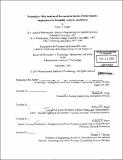| dc.contributor.advisor | Michael W. Golay William W. Hogan and Richard D. Tabors. | en_US |
| dc.contributor.author | Felder, Frank Andrew | en_US |
| dc.contributor.other | Massachusetts Institute of Technology. Technology, Management, and Policy Program. | en_US |
| dc.date.accessioned | 2005-08-23T18:41:10Z | |
| dc.date.available | 2005-08-23T18:41:10Z | |
| dc.date.copyright | 2001 | en_US |
| dc.date.issued | 2001 | en_US |
| dc.identifier.uri | http://hdl.handle.net/1721.1/8257 | |
| dc.description | Thesis (Ph. D.)--Massachusetts Institute of Technology, Sloan School of Management, Technology, Management, and Policy Program, 2001. | en_US |
| dc.description | Includes bibliographical references (p. 193-209). | en_US |
| dc.description.abstract | Modem society requires reliable and safe operation of its infrastructure. Policymakers believe that, in many industries, competitive markets and regulatory incentives will result in system performance superior to that under command-and-control regulation. Analytical techniques to evaluate the reliability and safety of complex engineering systems, however, do not explicitly account for responses to market and regulatory incentives. In addition, determining which combination of market and regulatory incentives to use is difficult because policy analysts' understanding of complex systems often depends on uncertain data and limited models that reflect incomplete knowledge. This thesis confronts the problem of evaluating the reliability of a complex engineering system that responds to the behavior of decentralized economic agents. Using the example of restructured and partially deregulated electric power systems, it argues that existing engineering-based reliability tools are insufficient to evaluate the reliability of restructured power systems. This research finds that electricity spot markets are not perfectly reliable, that is, they do not always result in sufficient supply to meet demand. General conclusions regarding the reliability of restructured power systems that some economic analysts suggest should be the basis of reliability policies are either verified or demonstrated to be true only when applied to extremely simple and unrealistic models. New generation unit and transmission component availability models are proposed that incorporate dependent failure modes and capture the behavior of economic agents, neither of which is considered with current adequacy techniques. | en_US |
| dc.description.abstract | (cont.) This thesis proposes the use of a probabilistic risk analysis framework as the foundation for bulk power-system-reliability policy to replace existing policy, which is an ad hoc mixture of deterministic criteria and risk-based requirements. This thesis recommends distinguishing between controlled, involuntary load curtailments and uncontrolled, involuntary load curtailments in power system reliability modeling. The Institute of Electrical and Electronics Engineers (IEEE) Reliability Test System is used to illustrate the possible impact that dependent failure modes and the behavior of economic agents have on the reliability of bulk power systems. | en_US |
| dc.description.statementofresponsibility | by Frank A. Felder. | en_US |
| dc.format.extent | 209 p. | en_US |
| dc.format.extent | 18265282 bytes | |
| dc.format.extent | 18265037 bytes | |
| dc.format.mimetype | application/pdf | |
| dc.format.mimetype | application/pdf | |
| dc.language.iso | eng | en_US |
| dc.publisher | Massachusetts Institute of Technology | en_US |
| dc.rights | M.I.T. theses are protected by copyright. They may be viewed from this source for any purpose, but reproduction or distribution in any format is prohibited without written permission. See provided URL for inquiries about permission. | en_US |
| dc.rights.uri | http://dspace.mit.edu/handle/1721.1/7582 | |
| dc.subject | Technology, Management, and Policy Program. | en_US |
| dc.title | Probabilistic risk analysis of restructured electric power systems : implications for reliability analysis and policies | en_US |
| dc.type | Thesis | en_US |
| dc.description.degree | Ph.D. | en_US |
| dc.contributor.department | Technology and Policy Program | |
| dc.contributor.department | Sloan School of Management | |
| dc.identifier.oclc | 50324821 | en_US |

